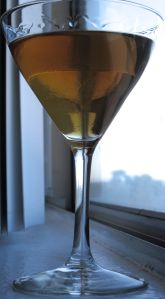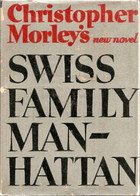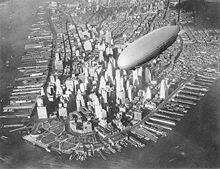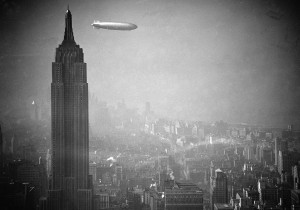The Drink
Thirteen hundred of these cocktails were said to have disappeared at the coming-out party for Swiss Family Manhattan on the eighty-fifth floor of the Empire State Building.
2/3 RYE WHISKY
1/3 ITALIAN VERMOUTH
1 DASH ABSINTHEStir and Serve Excessively Cold
– From So Red the Nose
This is the first So Red the Nose drink that I just could not finish. This project may be developing my taste for hard liquor, but not to the point where I can happily drink straight rye whiskey with no sweetener. I spent the whole time reading this book counting down the minutes until I could pour the foul thing down the drain.
I will say, however, that I enjoy a “dash” of absinthe more than a full jigger. A little goes a long way for that particular flavor.
The Book
Swiss Family Manhattan is a good example of how writers don’t tend to be good judges of their own works. For example, Charles Dickens, author of the endlessly-retold Christmas Carol and the tirelessly-quoted Tale of Two Cities, said that, “In a hundred years, I hope to be remembered as the man who wrote Martin Chuzzlewit” (Um. Who?).
Similarly, although I personally have never heard of Christopher Morley, he wrote several novels that modern readers still care about. Swiss Family Manhattan, the book he chose to represent his work in So Red the Nose, is not one of them.
This book is so obscure that I actually had to create the Goodreads page for it, and Amazon had neither reviews nor synopsis. The only Google results for it, other than the book itself, are contemporary reviews in scanned newspapers from the 1930’s (which I thoroughly enjoyed reading, by the way).
So I came into this book with absolutely no prior knowledge, but it essentially does what it says on the tin. Morley borrows the characters from the children’s classic Swiss Family Robinson, who find themselves on a new adventure, this time in New York City rather than the East Indies. This all happens by way of the most gloriously nostalgic vehicle of them all: THE LUXURY AIRSHIP!
In order to understand this novel, I first had to understand the book it was parodying. The Swiss Family Robinson was, surprisingly enough, actually written by a Swiss man, specifically Lutheran pastor Johann David Wyss. In the totally-not-plagairized-why-would-you-even-ask vein of Robinson Crusoe, the Robinson family is shipwrecked onto a deserted island, and learns many Life Lessons as they work together to survive. Quite a bit of the humor of Manhattan comes from mimicking Wyss’s corny, educational tone.
After the family crash lands onto the yet-unfinished skeleton of the Empire State building, they set up “camp” and begin to observe the local “anthropoids,” believing themselves to have landed in a giant tree surrounded by another uncivilized wilderness. From this innocent point of view, our narrator Mr. Robinson is able to make some satirical observations about American society.
The book skewers both the Swiss (with some timeless jabs at the League of Nations) and American (with some timeless jabs at Prohibition) cultures. Allow me to summarize the main points of the novel in this handy chart:
| Swiss Family Manhattan | 1990’s/Aughts Translation |
| “From side to side the streets were filled with a roaring sequence which flowed spasmodically in a monotone of exploding gases…If delayed more than a few seconds one, more ill-tempered than the rest, would utter a yelp of annoyance, and this was taken up by the whole pack, braying in gusts of impatience.” | “Get home, bastard man!” |
| “Like birds of paradise rich millinery idols perched in caves of glass, looked out in bright fixity of simper. I divined that the females were at their morning worship; painted and adorned for the sacrament of trade, they refreshed themselves with harmless gazing at these images.” | “Women be shoppin’!” |
| (About book clubs) “They convened very secretly once a month to crown some volume with profitable laurels and hastily returned to their villegiature.” | “So, you pretty much read whatever Oprah tells you, huh?” |
Although Morley does have some pointed comments to make about American culture, the teasing definitely comes from a place of love. The story, at heart, is a passionate homage to the rising skyscrapers around him, and to the entirely American enterprise that created them. Wary at first, the Robinsons eventually reject their Swiss efficiency and bureaucracy in order to wholeheartedly embrace capitalism, first as a owners of a speakeasy (or “speecheasy” as they call it), and then by setting up their own gas station.
The book is a comedic romp, with close to zero plot or character development. Main character Mr. Robinson dashes from one adventure to the next — and one idea to the next — with little set-up or resolution. Even the device of him not realizing he is in “civilized” country is only used inconsistently (Several times he slips and says “skyscraper” instead of “tree.”) and dropped fairly quickly.
Forgotten classic or better left in the past?
Some humor is timeless, but much of it is incredibly context dependent, and we no longer live in a context where jokes about La Vie Parisienne, women’s leagues, or ginger cubes make us laugh out loud. The parts that did make me chuckle are now clichés (see Chart 1A); the parts I didn’t get were only sort of mildly interesting from a historical point of view. Having to research jokes definitely takes the joy out of reading.
There is no doubt in my mind that Morley’s writing is very clever. I could tell that each sentence is layered with meaning, whether I understood that meaning or not. And it is an orgy of early-century New York nostalgia, with such highlights as the luxury airship (airship!), a bubbly flapper side character, and 7 gallons of gasoline for a dollar. In the end, Swiss Family Manhattan might make a good book to study, but it is not a particularly entertaining book to read.
The Swiss Family Manhattan can be electronically borrowed from the Internet Archive.
Next time:




